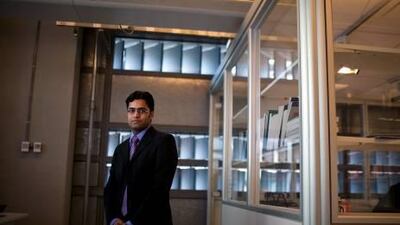ABU DHABI // As local oil companies explore opportunities to expand carbon-capture and storage (CCS) technology, a young researcher has been assessing the challenges associated with the emerging method.
With CCS, carbon dioxide is injected into ageing oilfields to enhance the recovery of crude.
Vijo Varkey, a student of engineering systems and management at Masdar Institute, has spent two years developing a system to measure the risks and uncertainties of regulations, and shortages of skilled labour, associated with the technology.
"This is what Abu Dhabi is currently in the early stages of and … just as other countries are facing impediments, Abu Dhabi is facing impediments," said Mr Varkey, 26, from India.
Regarded as a way to reduce carbon dioxide emissions, CCS would free up more natural gas for use in fuelling power generation.
If Abu Dhabi could inject carbon dioxide - as much as 30 million tonnes a year - it could possibly earn the UAE carbon credits, which can be sold to corporations in developed nations, and international prestige under a UN system to combat climate change.
But the burgeoning sector has had hiccups.
The Gulf region's first project to store greenhouse gases underground has been held up by pricing issues between Masdar, Abu Dhabi's clean-energy company that developed the institute, and Abu Dhabi National Oil Company.
Last year, one fifth of all such projects worldwide were cancelled or delayed, according to the Global Carbon Capture and Storage Institute.
"Though in the early stages, there are financial constraints and these are capital-intensive projects," said Mr Varkey.
"They [investors] are taking a hard look at this sector and … taking one step at a time, and making sure it is the right time and right amount of resources."
Mr Varkey received a master's degree in mechanical engineering at the University of Texas at Austin in the United States.
He said the country's carbon-capture and renewable energy sectors were growing at an increasing pace.
"[But] we need to ensure that it can be sustained, and there needs to be an incentive for the stakeholders to be a part of this project," Mr Varkey said
He hopes to find a position at an energy company related to the "pioneering field".
"This is a new concept and Masdar is going into new frontiers," Mr Varkey said.

